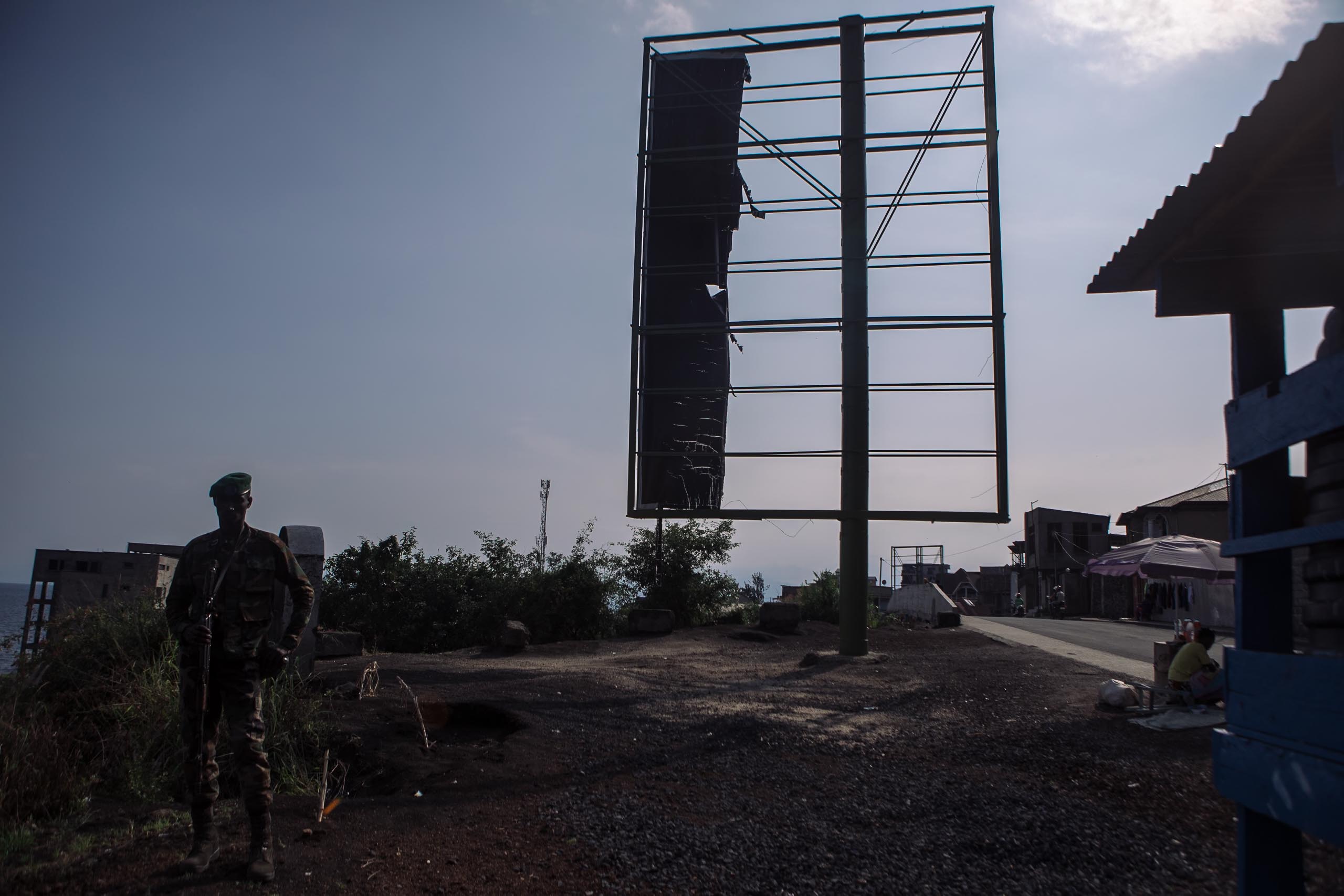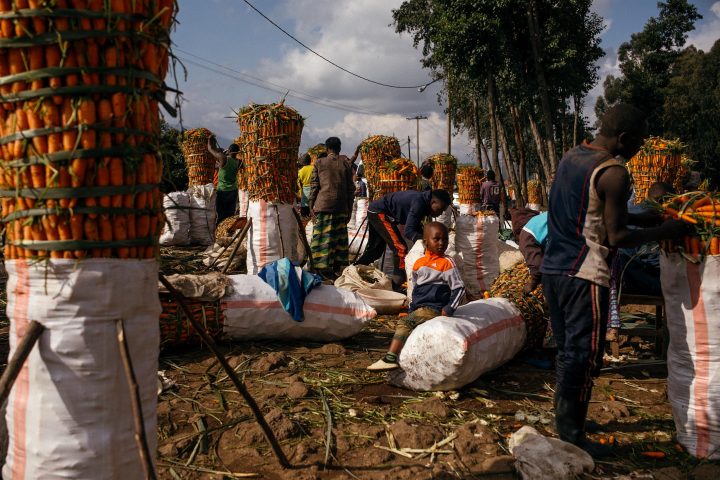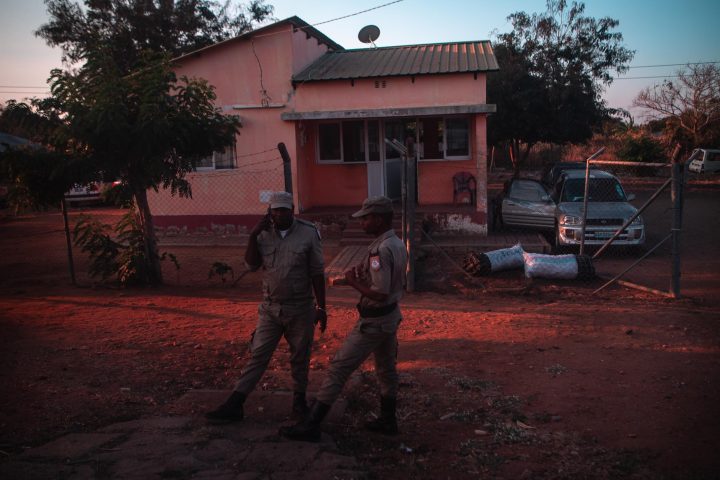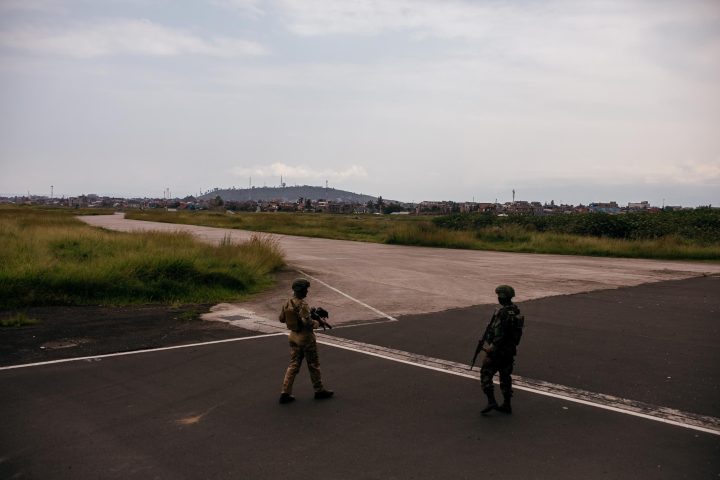Kagame’s hidden war
Rwanda’s military deployments in Mozambique and its shadowy ties to M23 rebels in eastern Congo are not isolated interventions, rather part of a broader geopolitical strategy to expand its regional influence.

An M23 soldier standing at a vista by Port Emmanuel on Lake Kivu by Goma, the capital and largest city of the North Kivu Province in the eastern portion of the Democratic Republic of the Congo on May 26, 2025. All photos © Kang-Chun Cheng.
What do the single biggest foreign investment on the African continent, the protracted humanitarian crisis driven by the rebel M23 paramilitary group in eastern Congo, and the upcoming Union Cycliste Internationale (UCI) World Cup held for the first time in Africa, all have in common? Rwanda.
Since 2021, the small east African nation has sent thousands of its troops to northern Mozambique’s Cabo Delgado province, after an ISIS Mozambique (ISM) attack at Palma, the site of a $25 billion liquified natural gas (LNG) project. The troop deployment has cost €200 million according to Africa Intelligence, although it’s unclear who exactly is footing the bill.
In January, Goma—a key city in the Democratic Republic of the Congo’s eastern North Kivu province—fell to M23 rebels. The coup was bloody, with more than 3,000 people killed and 400,000 displaced. Those who have remained live in active fear and forced conformity to M23’s paranoia-fueled grip over the city.
Those who travel to M23 territory—including Goma, Bukavu, Rubaya, and the trade hub of Minova—and journalists in particular, have a good chance of being blacklisted from the Congolese government-controlled territory in the west. The United Nations (MONUSCO) and other humanitarian groups lingering in Goma know this all too well. They have been checkmated; M23 refuses to recognize or negotiate with them, while any sort of liaising with the rebel group would make them outcasts in the eyes of the Congolese government. “[The UN] has been utterly humiliated,” someone on the ground in Goma said when I was there in late May.

Lastly, Kigali will be hosting the UCIs this September. The alchemy of the capital city’s smooth asphalt roads and rolling hills makes for one of the toughest road cycling race courses, a still-Eurocentric sport. This, too, aligns with President Paul Kagame’s vision and pride in bringing Rwanda onto the map as a global destination. Furthermore, championing cycling aligns with its 2030 National Sports Policy: amplifying domestic health and lifestyle through high performance in sports.
In less than three decades, Kagame has managed to achieve what many of his neighbors have been vying for. Rwanda’s economic and social cohesion was catalyzed by a genocide in 1994 that shocked the world in terms of both its violence and psychological manipulation. Seemingly at the drop of a pin, upon receiving orders through radio programs and insidious ideology to kill “like bugs,” Hutus turned on Tutsis, slaughtering them with abandon, killing more than one million—70% of the ethnic minority, nearly one-fifth of Rwanda’s total population—in just 100 days. As part of its recovery, Rwanda vowed to overcome its past.
Rwanda recovered from something beyond imagining with the cadence of a seasoned dressage horse, nearly too good to be true. A genocide museum was established in 2004—the resting place of the remains of nearly 250,000 victims. The nation also cleaned itself, literally. At times dubbed the Singapore of Africa, it is regionally unique in how clean its streets are and how safe it is to stroll them, even alone at night.
Yet Rwanda’s aspiration to acquire wealth, derived from both its own mineral riches and those of its neighbors, has hurled the nation in curious directions. Upon the discovery of five trillion cubic meters of gas reserves offshore in northern Mozambique in 2010 by Anardarko, an American energy company, TotalEnergies, Exxon Mobil, and ENI became the main LNG project investors.
In 2021, jihadist insurgents—self-identified as machababos (meaning “the kids” in local language) and called ISIS Mozambique (ISM) aka Ansar al-Sunna by the American government—launched a deadly attack in Palma that killed nearly 1,200 people. The insurgents claim to fight for the Muslim civilians that the Mozambican government has long neglected in Cabo Delgado.An additional 209 were abducted and presumed dead. TotalEnergies halted the project, declaring force majeure, a decree that still stands today. Through a series of covert deals with former Mozambican president Felipe Nyusi, Kagame began sending in deployments of the Rwanda Defense Forces (RDF) to Cabo Delgado to protect the LNG site and support afflicted local villages.

“Rwandans know that Western aid partners can’t deal with these other conflicts—who else is going to step into northern Mozambique?” says Ladd Serwat, a senior analyst at the non-profit organization, Armed Conflict Location & Event Data (ACLED). “It’s really reminiscent of Israel’s rhetoric in Gaza, ‘we are the ones the West has forgotten, we are the victims’—and thus, the victims become the oppressor and continue relying on the post-genocide rhetoric,” Sewart adds. Internalized legitimacy creates momentum for external rhetoric. “It’s not that [prejudice] doesn’t exist—for instance, white farmers in South Africa can point to where [discrimination] happens, but it’s obviously just a small part of the bigger picture.”
Rwanda has developed a reputation as the West’s “donor darling,” receiving $1.3 billion in foreign aid in 2021 (with $174 million coming from the US, its biggest donor). It has narrowed to Western definitions of success in both material and expansionist tendencies. Kagame and other Rwandan political leaders have long denied direct military involvement or support for M23. They prefer to allude to justifications for Rwandan involvement in the DRC—threats to both domestic and regional security, Congolese political propaganda to invade Rwanda, violence against Congolese Tutsi—according to a September 2024 ACLED report. This is despite more than 100 separate sources from across eastern Congo indicating RDF presence or support of M23, says Serwat. “They’re all pointing to the same thing: Rwandan influence is a foregone conclusion.”
Beyond realpolitik, the Rwandans have other skin in the game. Studies and eyewitnesses have long indicated the smuggling of critical mineral resources from eastern DRC to Rwanda and other nations in the region. In his indirect responses to meddling in eastern DRC, Kagame has referenced the colonial construction of the region’s borders, claiming this part of eastern DRC as formerly part of Rwanda.
Yet over recent months, Kagame’s denials have softened somewhat. According to Serwat, at one point, his stance shifted from point-blank denials to, “We don’t know if the RDF is in eastern Congo anymore.” Furthermore, the types of arms being used serve as another indicator of RDF intervention. “If weapons are sophisticated enough, M23 wouldn’t know how to use them,” explains Serwat. “The RDF is either training M23 or operating alongside them.”
From a tactical perspective, the relatively limited targeting of civilians could serve as another indicator of Rwandan influence. “The targeting of civilians by the RDF is very limited. Even for M23, they have been rather restrained in most attacks, limiting the number of civilians caught in the crossfire,” continues Serwat. “The RDF does really fear an overstepping of boundaries when it comes to violence and sexual attacks.”
The ACLED data suggests that Rwanda remains one of the most substantive driving forces in eastern DRC. Political deals have a significant influence, with the addition of local dynamics and skirmishes. “I don’t think M23 can do much beyond Rwandan interest,” says Serwat. “Even from a quantitative perspective, high-level ceasefires cut M23 attacks by 75%.”
Concurrently, Rwanda leverages its peacekeeping presence across the African continent when confronted by foreign critique of support for M23, which Kagame has repeatedly denied, threatening to rescind peacekeepers from missions. Peter Bofin, ACLED’s southeast Africa senior analyst, notes that deficiencies in understanding of “obscure” places such as northern Mozambique work in Kagame’s favor. Western ignorance of local and regional dynamics supports Rwanda’s expansionist tendencies, the analyst adds.

After more than seven months of slapdash planning with the RDF, a colleague and I arrived in Kigali on a sticky evening this past May, the air practically leaking with the promise of a cloudburst. We were scheduled to depart early the next morning on a Rwandan military helicopter to Pemba, Cabo Delgado, along with 10 other journalists and researchers. This was part of a five-day tour of the RDF’s commitments in Cabo Delgado, from their perspective.
“It’s not going to be a real embed, more of a horse-and-pony show,’ my colleague noted, having embedded with special forces dozens of times in the Middle East over the decades. This would be my first embed––regardless of how “real” it would be––I was excited. I was tasked with the photography, and now that we’d landed in Kigali, after unbelievable loads of hassle in the weeks leading up to this ‘embed,’ things had to be in the bag.
We were wrong. A few minutes before the scheduled flight, we received a text from the strategist of the Office of the President notifying us that the trip to Mozambique was off due to “unforeseen issues.” Scheduling complications with the helicopter landing in Pemba had necessitated a cancellation of the entire trip, we were informed. I was convinced that this was all a setup. But my colleague suspected deeper issues.
“See how embarrassed the Rwandans are,” he said. They came up with a technical excuse in an attempt to not have the thinning veneer of control in a region they had been working for years to stabilize, crumble entirely. Cabo Ligado reports from that week indicate it was among 2025’s deadliest, recording five ISM-linked attacks. The Rwandans indeed seemed determined to offer us an alternative, even if that meant revealing a different hand entirely. “Everything up in the air,” my colleague texts me. “Might go to Goma.”
That’s how we found ourselves peeling off from the other media, scrambling to prepare for Goma in a few days. Entry to M23 territory requires an alchemy of circumstances, from visa officers’ moods to the particular state of affairs in eastern Congo at the time. It’s a topic of speculation within many regional press groups. But we had special backing: the Rwandan Office of the President was facilitating our visit to eastern Congo, connecting us with the M23 spokesperson, and offering to pay for our accommodation and meals (which we had to decline for reasons of editorial independence).
In Goma, our Rwandan companion declined to remove his facemask in public. “I can’t be identified here,” he eventually admitted. It was one of those trips where I was struggling to keep up with the situation at hand. Rwanda has yet to openly admit backing M23 in eastern Congo, yet those working in the president’s office were ensuring our access to rebel-controlled territory. Only on the way back from Goma after three days on the ground did I turn to my colleague and ask, “Did that really just happen? The Rwandans connected us to M23?” We looked at each other and shrugged.
Rwanda’s role across the region underscores a troubling paradox: the same country hailed for post-genocide recovery and global partnerships is also entangled in conflicts that fuel displacement and disorder. Whether deploying troops to safeguard gas fields in Mozambique or quietly shaping events in eastern Congo, Rwanda has positioned itself at the heart of the continent’s most pressing crises. That it is also hosting Africa’s first UCI World Cup this year only deepens the contrast. A nation remade as a model of order now finds its influence shadowed by the chaos it helps contain—and sometimes create.



